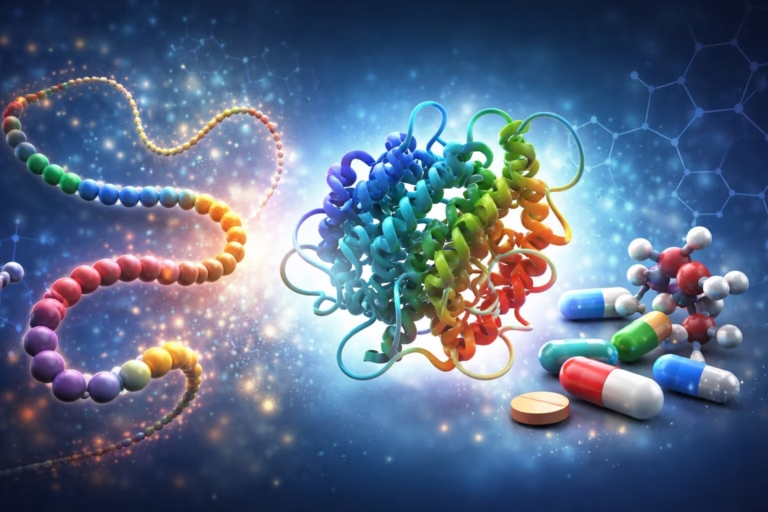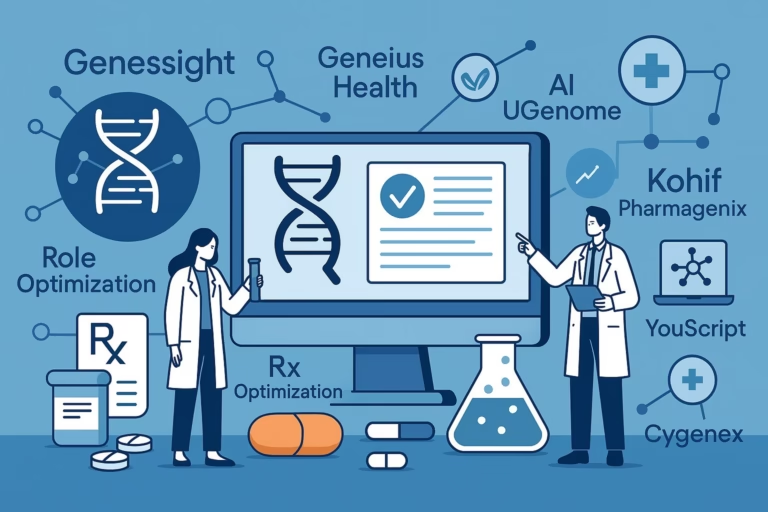The realms of Pharmacokinetics, Pharmacogenetics, and Pharmacogenomics are crucial in the advancement of personalized medicine. Grasping these concepts is vital for boosting treatment effectiveness and reducing drug side effects. Pharmacokinetics delves into how the body processes drugs, including absorption, distribution, metabolism, and excretion. On the other hand, pharmacogenetics explores how genetic variations influence drug responses in individuals. Pharmacogenomics, however, examines an individual’s entire genetic profile to forecast drug reactions across different therapeutic fields.
Through genetic testing, both pharmacogenetics and pharmacogenomics strive to refine drug treatments and improve patient outcomes. This addresses the critical issue of drug response variability. These innovations are key to crafting customized treatment plans that align with an individual’s genetic makeup. This approach significantly enhances patient care and shapes clinical practices and informs clinical practices. Recognizing these distinctions is essential for the future of healthcare1.

Understanding Pharmacokinetics
Pharmacokinetics delves into the absorption, distribution, metabolism, and excretion of drugs within the body. It is divided into four key phases: drug absorption, distribution, metabolism, and excretion, following the ADME model. These phases significantly influence a drug’s efficacy within an individual’s system.
In critically ill patients, pharmacokinetic parameters can undergo substantial alterations. For instance, atorvastatin’s maximal concentration (Cmax) and area under the curve (AUC) values were found to be 18- and 15-fold higher in sepsis patients compared to healthy individuals2. Factors such as enteral feeding tubes and physiological changes can impede drug absorption in these patients2. Additionally, decreased perfusion limits drug absorption, as the body prioritizes blood flow to vital organs2.
Genetic factors also play a pivotal role in pharmacokinetics. Variations in the CYP2D6 gene, for example, determine an individual’s metabolic rate of certain drugs, affecting both efficacy and side effects3. The activation of prodrugs like codeine by enzymes underscores the significance of genetic influences in drug metabolism3.
Evaluating pharmacokinetics is essential for healthcare professionals aiming to customize drug regimens for individual patients. This is particularly crucial for those with pre-existing conditions or unique genetic profiles.
Edema in critically ill patients can result in variable drug absorption rates, significantly impacting treatment efficacy2. Grasping these complex relationships allows clinicians to enhance therapeutic outcomes and reduce adverse reactions. This leads to a more personalized approach in pharmacotherapy.
Check out this video: https://www.youtube.com/watch?v=3S20pnv28ys
Defining Pharmacogenetics
Pharmacogenetics explores the intricate relationship between genetic variations and drug responses. It focuses on polymorphisms in genes linked to enzyme activity, transporters, and drug targets. This knowledge uncovers why some individuals metabolize drugs differently, affecting treatment outcomes and potential side effects.
Genetic differences in drug-metabolizing enzymes explain variations in drug concentrations and effects. For instance, genetic variants in CYP2C19 significantly influence the efficacy of omeprazole. This highlights the importance of personalized treatment plans in pharmacotherapy4. Patients’ unique genetic profiles may require adjusted drug dosages or choices to achieve optimal results.
Pharmacogenetic testing enables healthcare providers to predict drug metabolism capabilities. This ensures therapeutic plasma levels effectively interact with drug targets. It prevents adverse reactions and enhances drug efficacy4. For example, individuals lacking necessary genetic enzymes for drugs like clopidogrel may experience ineffective treatment, affecting their health.
The core of pharmacogenetics is its role in tailoring medication regimens. It maximizes therapeutic effects while minimizing adverse event risks. This targeted approach gains importance as healthcare moves toward personalized medicine focusing on genetic variations and their drug response implications.
What is Pharmacogenomics?
Pharmacogenomics delves into the intricate relationship between an individual’s genetic makeup and their drug responses. It extends beyond pharmacogenetics, examining the entire genome for drug interactions. This holistic approach is essential for enhancing drug efficacy and safety by personalizing treatments based on a patient’s genetic profile.
Pharmacogenomics focuses on the genetic determinants of drug absorption, metabolism, and excretion. It enables healthcare providers to predict therapeutic outcomes more accurately. By analyzing data from diverse biogeographic groups, they can minimize adverse drug reactions. This systematic approach is particularly beneficial in complex cases, reducing the reliance on trial-and-error methods.
The goal of integrating pharmacogenomics into clinical practice is to achieve precision medicine. This involves tailoring therapies to match a patient’s genetic background. As research advances, the focus on genetic factors will likely lead to enhanced patient outcomes. This underscores the critical role of pharmacogenomics in modern medicine5.
| Year | Achievement |
|---|---|
| 2024 | Received Luminary Award from PMWC |
| 2021 | Elected as a Fellow of the American Association for the Advancement of Science |
| 2015 | Recognized as a Fellow of the American College of Medical Genetics and Genomics |
| 2001 | Acknowledged as a Fellow of the American College of Medical Informatics |
| 1980 | Graduated with a B.A. in Chemistry/Biology from UC Santa Cruz |
| 1987 | Earned a Ph.D. in Medical Information Sciences from UC San Francisco |
The Role of Drug Metabolism in Pharmacokinetics
Drug metabolism is crucial in pharmacokinetics, determining a drug’s duration of activity in the body. Primarily occurring in the liver, this process is largely facilitated by CYP450 enzymes. These enzymes are vital for the biotransformation of various drugs. Genetic polymorphisms can significantly affect enzyme activity, leading to variations in how quickly drugs are metabolized. This can result in sub-therapeutic effects or toxicity. A notable example is the study on the genetic influences on pharmacokinetics of digoxin, which underscored the importance of individual metabolic profiles6.
Understanding the specific enzyme activity linked to CYP450 enzymes can enhance therapeutic outcomes in personalized medicine. For instance, genetic variability in patients suggests that different individuals may respond unpredictably to the same medication due to differing enzyme activities. Research has shown that certain polymorphisms in the CYP2D6 gene can lead to altered drug metabolism among populations7. Factors such as age, body composition, and the presence of other medications can further complicate drug metabolism profiles, making individualized assessment essential.
The interaction between drug metabolism and pharmacokinetics highlights the necessity for clinicians to consider both genetic factors and environmental influences. This comprehensive approach can optimize pharmacotherapy, enhancing efficacy while minimizing adverse effects. Continuous research into genetic variations and enzyme interactions will further our understanding of drug metabolism’s role in pharmacokinetics. This will guide personalized treatment strategies.
Pharmacokinetics, Pharmacogenetics and Pharmacogenomics: Key Differences
Grasping the key differences between pharmacokinetics, pharmacogenetics, and pharmacogenomics is crucial for improving patient care. Each field offers unique insights into drug response, yet their focus areas diverge. Pharmacokinetics delves into how the body processes drugs, encompassing absorption, distribution, metabolism, and elimination. In contrast, pharmacogenetics examines specific genetic variations that influence drug responses. Pharmacogenomics, meanwhile, provides a comprehensive view of how genetic makeup affects responses to various medications. This complex interplay significantly influences treatment protocols and therapeutic outcomes.
Focus Areas of Each Discipline
The distinct focus areas of pharmacokinetics, pharmacogenetics, and pharmacogenomics define their roles in healthcare. Pharmacokinetics involves:
- Analyzing the life cycle of drugs within the body, tracking their journey through various physiological processes.
- Determining how different factors such as age, weight, and comorbidities affect drug metabolism and elimination.
Pharmacogenetics, on the other hand, focuses on:
- Identifying genetic polymorphisms that affect drug metabolism.
- Assessing how these genetic markers influence efficacy and safety.
Lastly, pharmacogenomics encompasses:
- A broader perspective that examines how whole-genome sequencing can be leveraged to predict drug responses.
- Integrating multiple genes’ interactions that may contribute to the variability in drug response.
Implications for Patient Care
The implications for patient care derived from these fields are profound. A tailored approach to drug therapy encourages:
- Personalized medicine that optimizes drug selection and dosage based on individual genetic profiles.
- The reduction of adverse reactions through precise matching of patients with the most suitable medications.
Integrating insights from pharmacogenomics into clinical practice can lead to enhanced treatment outcomes. For instance, genetic factors can account for up to 95% of the variability in drug disposition and effects for certain drugs, reinforcing the importance of understanding these disciplines in patient care8. The FDA and EMEA support the incorporation of pharmacogenomics in clinical development, highlighting that refining drug administration and adherence can foster better health outcomes9. The ongoing evolution in the field of pharmacogenomics promises to reshape how healthcare providers approach individualized treatment strategies, ultimately benefiting patients seeking effective therapies with minimal side effects.
Importance of Personalized Medicine in Pharmacotherapy
Personalized medicine marks a significant shift in pharmacotherapy, tailoring treatments to individual patients based on genetic, environmental, and lifestyle factors. This approach optimizes medical interventions by integrating pharmacogenetics and pharmacogenomics into daily clinical practice. It enhances treatment outcomes by considering each patient’s unique profile.
Healthcare providers can significantly boost drug efficacy and minimize adverse effects by crafting patient-specific treatment plans. Research highlights the role of genetic variations, such as the UDP-glucuronosyltransferase 1 (UGT1A1) gene, in personalized therapies10.
Pharmacogenomics sheds light on how genetic differences influence drug metabolism and response. For example, the MDR1 C3435T polymorphism profoundly affects digoxin pharmacokinetics and gene expression, underscoring its importance in drug selection and dosing10.
This innovative strategy could reduce healthcare costs by avoiding ineffective treatments and minimizing trial-and-error approaches in pharmacotherapy. The mounting evidence supports the integration of personalized medicine into routine medical care, promising broader applications.

Genetic variants, such as those in the UDP-glucuronosyltransferase 1A1 gene, predict severe neutropenia risks when using irinotecan, enhancing medication safety10. Screening measures, like HLA-B*5701 for abacavir hypersensitivity, demonstrate the critical role of pharmacogenomics in identifying at-risk patients10.
Pharmacogenomic research advances healthcare towards more personalized and efficient pharmacotherapy. As the field advances, incorporating these insights becomes crucial for enhancing treatment outcomes across diverse medical areas.
The evolution of personalized medicine aims to improve drug efficacy and create a more effective healthcare system, focusing on patients’ unique needs.Learn more about personalized medicine and its applications here
Drug Response Variability: The Impact of Genetics
Optimizing drug efficacy and safety hinges on grasping drug response variability. The way individuals react to medications varies widely, influenced by genetic factors. These factors affect drug absorption, metabolism, and interaction with targets. Research shows genetic factors can explain 20% to 40% of drug metabolism and response differences11. This underscores the role of pharmacogenetics in personalizing treatments for better patient outcomes.
Genetic Factors Influencing Drug Response
Genetic elements significantly shape drug treatment outcomes for certain drugs or classes. Polymorphisms in genes like CYP450 can alter drug metabolism and effectiveness11. For example, variations in the CYP450 enzyme family can impact up to 25% of drug therapies11. Single-nucleotide polymorphisms (SNPs) are common, making up 90% of genetic variations. These can result in different metabolic phenotypes, such as ultra-rapid, normal, intermediate, or poor metabolizers11.
Variability in Drug Efficacy and Safety
Drug levels can vary significantly among individuals, even with similar body weights, highlighting the variability in drug efficacy and safety12. Genetic factors play a crucial role in these differences. Fewer than 50% of adverse drug reactions (ADRs) in clinical settings have identifiable causes, often due to pharmacogenetic disparities12. Increasing genetic screening in clinical practice could lower severe ADRs, which contribute to about 100,000 deaths annually in the U.S11. By addressing genetic variability, healthcare can potentially reduce hospitalization risks by up to 30%, enhancing both drug safety and efficacy11.
Real-World Applications of Pharmacogenetics
Pharmacogenetics is pivotal in the real-world application of medicine, enhancing therapeutic outcomes and reducing adverse drug reactions. It has been found that over 400 genes influence drug metabolism, with approximately 200 linked to adverse drug reactions13. For instance, pharmacogenetic testing aids clinicians in tailoring warfarin dosages to a patient’s genetic profile, particularly their CYP2C19 genotype14.
In the realms of cardiovascular diseases and oncology, pharmacogenetics shows significant promise. Studies reveal that 82% of patients support the use of pharmacogenetic tests for medication adjustments13. Moreover, the predictive value of the HLA-B*5701 allele significantly improves the efficacy of medications like flucloxacillin, highlighting its substantial impact on treatment outcomes15.
The European pharmacogenetics of anticoagulant therapy (EU-PACT) trial exemplifies this potential, aiming to evaluate the clinical benefits of genotyping before initiating therapy with drugs like warfarin15. The continuous evolution of pharmacogenetic testing technologies heralds a new era for personalized medicine, promising to transform healthcare across various disciplines.
| Application Area | Key Insights | Impact |
|---|---|---|
| Cardiovascular Diseases | Use of CYP2C19 genotyping | Enhanced safety and efficacy in treatment |
| Oncology | Medication personalization based on genetic profiling | Reduction in trial and error for drug selection |
| Anticoagulants | EU-PACT trial for warfarin prescriptions | Improved patient outcomes through genetic testing |
| General Medicine | Increased implementation of pharmacogenetic tests | More tailored medication adjustments |
The Future of Pharmacogenomics in Healthcare
The future of pharmacogenomics in healthcare is poised to transform the realm of personalized treatment. Advances in genomic technologies empower healthcare professionals to select the most suitable therapies for each patient. This shift towards customized pharmacotherapy is essential, given the growing recognition of how genetic variations affect drug efficacy and safety1617.
Furthermore, as pharmacogenomic research evolves, incorporating pharmacogenomic testing into everyday healthcare will become more streamlined. Bodies like the American Pharmacogenomics Association are crucial in raising awareness and providing education. This supports enhanced patient care18. The accumulation of knowledge on genetic diseases affecting drug responses heralds a future where adverse reactions are minimized, and therapeutic outcomes are maximized.
In conclusion, the future of pharmacogenomics holds great promise for healthcare, promising to elevate it through personalized treatment. By grasping the unique genetic profiles of patients, clinicians can cut down on drug development failures’ costs. This leads to more effective and safe pharmacotherapy for a wide range of patient populations161718. For more articles see our blog.
Source Links
- Pharmacogenetics vs Pharmacogenomics: What’s the Difference? – https://clarityxdna.com/blog/learn/pharmacogenetics-vs-pharmacogenomics-whats-the-difference/?srsltid=AfmBOopAPQyfxG6U_rcptERJlRvmszIDMVfmdOWaIj9jeZYnMvmJEfas
- PDF – https://www.accp.com/docs/bookstore/ccsap/c2016b2_sample.pdf
- Pharmacogenomics: mechanisms of action – Genomics Education Programme – https://www.genomicseducation.hee.nhs.uk/blog/pharmacogenomics-mechanisms-of-action/
- Pharmacogenetics vs Pharmacogenomics: What’s the Difference? – https://clarityxdna.com/blog/learn/pharmacogenetics-vs-pharmacogenomics-whats-the-difference/
- Role of Pharmacogenetics in the Treatment of Acute Myeloid Leukemia: Systematic Review and Future Perspectives – https://www.ncbi.nlm.nih.gov/pmc/articles/PMC8954545/
- Pharmacogenomics: The genetics of variable drug responses – https://www.ncbi.nlm.nih.gov/pmc/articles/PMC3093198/
- Pharmacogenomics of Drug Metabolizing Enzymes and Transporters: Relevance to Precision Medicine – https://www.ncbi.nlm.nih.gov/pmc/articles/PMC5093856/
- Microsoft Word – Benjeddou – https://www.ajol.info/index.php/ajb/article/view/125765/115304
- Regulatory Aspects of Pharmacogenetics and Pharmcogenomics in Clinical Drug Development – https://www.dgra.de/media/pdf/studium/masterthesis/master_brauers_g.pdf
- Pharmacogenetics: implementing personalized medicine – https://www.ncbi.nlm.nih.gov/pmc/articles/PMC2781211/
- Role of Pharmacogenomic Biomarkers In Predicting and Improving Drug Response: Part 1: The Clinical Significance of Pharmacogenetic Variants – https://www.ncbi.nlm.nih.gov/pmc/articles/PMC3828931/
- Overview of pharmacogenomics – UpToDate – https://www.uptodate.com/contents/overview-of-pharmacogenomics
- Interplay between Pharmacokinetics and Pharmacogenomics – https://www.intechopen.com/chapters/84671
- Pharmacogenomics for Primary Care: An Overview – https://www.mdpi.com/2073-4425/11/11/1337
- Pharmacogenetics and pharmacogenomics: practical applications in routine medical practice – https://www.ncbi.nlm.nih.gov/pmc/articles/PMC3092120/
- Overview of Pharmacogenetics and Pharmacogenomics in drug discovery process – https://www.biotechnologyforums.com/thread-1774-lastpost.html
- Precision medicine: from pharmacogenomics to pharmacoproteomics – Clinical Proteomics – https://clinicalproteomicsjournal.biomedcentral.com/articles/10.1186/s12014-016-9127-8
- PDF – https://pharmacy.unc.edu/wp-content/uploads/sites/1043/2019/09/Wiltshire-CV-2020.pdf





